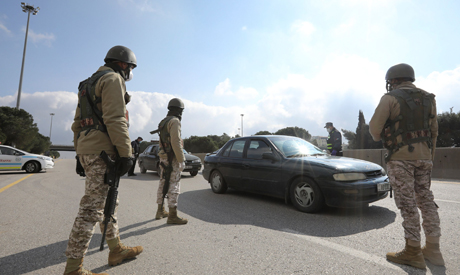
Jordanian army members and police personnel at a checkpoint during the second day of a nationwide curfew (photo: Reuters)
Most of the Gulf countries are going into almost full lockdown for a few weeks, or until further notice, in an effort to contain the spread of the Covid-19 coronavirus among their populations.
Though the numbers of confirmed cases are relatively small compared with other countries and regions, the authorities are taking the coronavirus pandemic very seriously. The Gulf states often have small populations, which could encourage the spread of the virus.
Moreover, large numbers of the populations of the Gulf countries are expatriates from different countries and cultures, while their native populations are small. This is also a cause of concern for the authorities.
Thus far, the authorities in the Gulf states are escalating measures to curb the spread of the virus among the population, with citizens following the instructions of their leadership and expatriates, most in the Gulf for better work opportunities, respecting the traditions of the countries hosting them.
People are aware of the good lifestyles they have been enjoying, and they see these as being in potential danger if they do not follow the instructions of their governments. But this awareness is being tested at a time of unprecedented crisis.
As markets tumble around the world with sharp drops in the prices of oil and gas, the main commodities that most Gulf countries rely on for their national incomes, citizens and residents of the Gulf countries understand that any measures needed to shorten the time span of the pandemic and its disastrous economic impacts are necessary for their own personal benefit as well as for their countries.
Not all the countries in the Gulf are the same, due to differences in economic strength and the readiness of the essential infrastructure that can help a country going into a lockdown. The drop in oil prices since 2014 has forced many Gulf countries to adopt cost-cutting measures that have kept their finances relatively sound, but not all have the same resources.
The UAE, which has been diversifying its economy for decades to reduce its reliance on revenues from hydrocarbons, is in a relatively better place when it comes to emergencies. The country has also been investing in developing infrastructure, especially communications technology and smart government, and this has helped many to work from home, whether in government or business.
Only few months ago, some were questioning the investment in G5 mobile-phone technology, while G4 was still being streamlined, asking why it was needed. The coronavirus pandemic has shown that the UAE government was ahead in doing the right thing.
While almost all Gulf governments have quickly injected liquidity into their economies to cushion the negative ramifications of the virus, the UAE has done more. The country relies more on trade and other economic sectors than the energy sector, which means it has a greater need for stimulus at times of economic crisis.
Some years ago, the Gulf countries started concentrating on the future “after oil.” Realising that they could not rely on their natural energy reserves as their main source of wealth forever, they sought the diversification of their economies, exploring sectors from tourism to financial services.
The current crisis has led to an almost global quarantine and the severance of travel and other activities, and it has been a serious wakeup call for the Gulf countries to stick to that vision of weaning their countries off oil and gas.
Another important aspect of the Gulf countries’ traditions is being put to the test by the current pandemic, forcing many to relate slogans more readily to actions in the field. The UAE has proved to be true to the principles it preaches by providing emergency medical and humanitarian aid to long-standing foe Iran, which is suffering greatly from the spread of the pandemic.
Though Emirati aid also goes to many other countries, the aid to Iran is significant in bearing out the UAE rhetoric about tolerance and the adoption of the principles of peace, stability and sustainable development.
As the world comes out of the current crisis in a different shape, the Gulf region will be in the midst of such changes.
*A version of this article appears in print in the 26 March, 2020 edition of Al-Ahram Weekly
Short link: